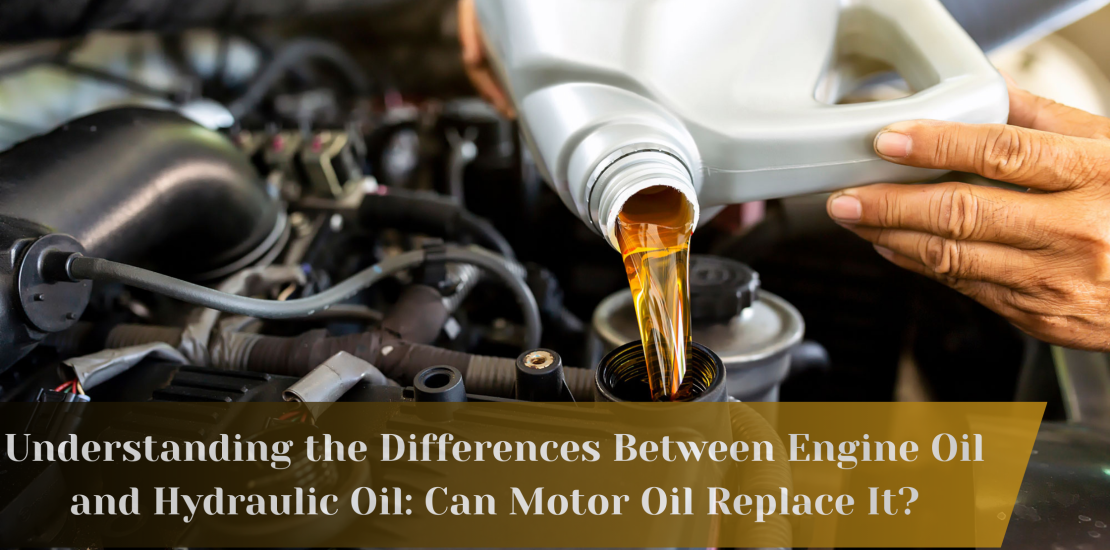Understanding the Differences Between Engine Oil and Hydraulic Oil: Can Motor Oil Replace It?
- September 4, 2025
- Posted by: General Petroleum
- Category: Blogs, Petroleum

In the world of heavy machinery and industrial operations, choosing the right type of oil is not just a matter of convenience—it is critical to maintaining equipment efficiency and longevity. This is particularly true in regions like the UAE, where the harsh operating conditions demand top-tier lubrication solutions. Lubricants Manufacturer UAE and UAE lubricants manufacturers for heavy machinery are constantly innovating to meet these demands, providing oils that can withstand extreme temperatures and high-pressure conditions. One common question that arises among machinery operators is whether motor oil, commonly used for engines, can replace hydraulic oil in hydraulic systems.
Understanding this issue requires a closer look at the specific requirements of each type of oil. The UAE’s Growing Demand for Superior Hydraulic Lubricants is driven by the expanding industrial sector and the need to ensure machines operate smoothly without downtime. Unlike engine oil, which is designed primarily to reduce friction between moving engine parts and withstand combustion by-products, hydraulic oil serves multiple roles, including transmitting power, providing lubrication, and preventing corrosion within hydraulic systems. How Quality Engine Oil is Powering Uganda’s Transport Growth highlights how tailored lubricants enhance operational efficiency, emphasizing that each oil type is formulated with a unique chemical structure to meet specific machinery needs.
At a glance, engine oil and hydraulic oil may seem similar, as both reduce friction and wear. However, their chemical composition and performance characteristics are fundamentally different. Engine oils are formulated with additives to manage high temperatures, neutralize acids, and protect against sludge buildup. Hydraulic oils, on the other hand, prioritize maintaining a stable viscosity under pressure, preventing foaming, and providing anti-wear protection for pumps, valves, and cylinders. Using engine oil as a substitute in hydraulic systems can result in reduced efficiency, increased wear, and even potential system failure.
Key Differences Between Engine Oil and Hydraulic Oil
Viscosity and Flow:
Viscosity plays a critical role in oil performance. Hydraulic oils are engineered to maintain consistent flow rates under varying pressure and temperature conditions. Engine oils, while effective in engines, may become too thin or too thick in a hydraulic system, leading to inefficient power transmission and increased wear on components.
Additives and Protection:
The additives in engine oil are designed to counteract combustion residues and minimize friction in high-temperature environments. Hydraulic oils require anti-wear additives, rust inhibitors, and sometimes fire-resistant properties, which are not present in standard engine oils. Replacing hydraulic oil with motor oil could compromise these protective functions.
Function in Machinery:
While both oils lubricate, only hydraulic oil is formulated to transmit power efficiently. Hydraulic systems rely on precise pressure and flow, which engine oils cannot consistently provide. Substituting engine oil can lead to erratic system behavior, increased maintenance costs, and potential equipment damage.
Risks of Using Engine Oil in Hydraulic Systems
Despite their similarities, using engine oil as a hydraulic fluid is generally discouraged for several reasons:
Increased Component Wear: Engine oil lacks certain anti-wear additives necessary for hydraulic pumps and valves.
Viscosity Instability: Under high pressure and temperature, engine oil may not maintain proper viscosity, affecting system efficiency.
Foaming and Aeration: Hydraulic systems require fluids that resist foaming. Engine oil can introduce air bubbles, reducing the system’s power transmission efficiency.
System Contamination: Engine oils may not be compatible with seals and gaskets in hydraulic systems, leading to leaks and potential failures.
When Substitution Might Be Considered
In emergencies, if no hydraulic oil is available, using engine oil temporarily may allow machinery to operate at low loads. However, this is strictly a short-term solution. Once normal operations resume, replacing the engine oil with the proper hydraulic fluid is essential to avoid long-term damage.
Choosing the Right Oil for Your Equipment
Partnering with a trusted Lubricants Manufacturer UAE or consulting UAE lubricants manufacturers for heavy machinery can help ensure you select the correct fluids for your machinery. These experts can guide you through specifications, including viscosity ratings, additive packages, and environmental considerations, ensuring that each component performs optimally.
With the UAE’s industrial growth, The UAE’s Growing Demand for Superior Hydraulic Lubricants continues to rise. Using the correct hydraulic oil not only extends machinery life but also maximizes productivity, minimizes downtime, and reduces long-term maintenance costs. Similarly, ensuring engine oil quality, as seen in How Quality Engine Oil is Powering Uganda’s Transport Growth, enhances transport efficiency, demonstrating that matching oil to its intended purpose is crucial for operational success.
Conclusion
While engine oil and hydraulic oil may appear interchangeable at a superficial level, their differences are significant enough to impact machinery performance and longevity. Hydraulic oils are specifically engineered to transmit power, protect components under pressure, and maintain stability under varying conditions—features that engine oils cannot replicate. Relying on a Lubricants Manufacturer UAE or consulting with UAE lubricants manufacturers for heavy machinery ensures that your operations run smoothly with the right fluids. In the end, respecting the distinct roles of these oils is not just a matter of performance but of safeguarding your investment in high-value equipment.

